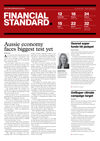Editor's Choice
Podcast: From silos to synergy
First Sentier Investors' global head of responsible investment Kate Turner joins The Greener Way to discuss how accounting for the many inter-reactions and flow-on effects of addressing specific sustainability issues can lead to improved outcomes.
Plenti wins WA government mandate
ASX-listed Plenti Group has won a mandate from the Western Australian government to help the state accelerate the adoption of batteries.
Carbon tariffs on some imports urgently needed: Climate Energy Finance
Despite the raging global trade war, Climate Energy Finance (CEF) is calling for carbon tariffs on some imports and for Australia to lead the way for a regional Asian carbon border adjustment mechanism (CBAM).
Climate investing declines amid Trump's anti-clean energy regime
Although investors are withdrawing from climate investing due to uncertainty from the aggressive approach by the US President Donald Trump in his pro-fossil fuels and anti-energy agenda, it opens up opportunities further afield.



















Whilst it is very pleasing to read that more and more companies are starting to realise that they have a moral responsibility to improve and report their sustainability performance it is not yet compulsory for publicly listed companies or government owned companies - and it should be.
Beyond the moral and transparency dimensions lies the economic.
According to the Carbon Disclosure Project, companies that implement policies to reduce carbon emissions perform better on the stock market compared with those that do not, a survey suggests.
The improved financial performance of companies with high carbon performance is a clear indicator that it makes good business sense to manage and reduce carbon emissions.
Those companies that are taking action to reduce their impact now believe they can gain a competitive advantage over their rivals.
Thank you for a very informative article. I would like to know though the current status on GRI global uptake by sectors and countries.